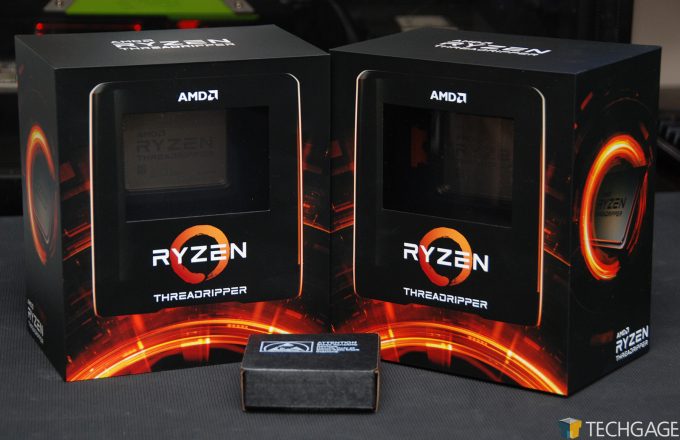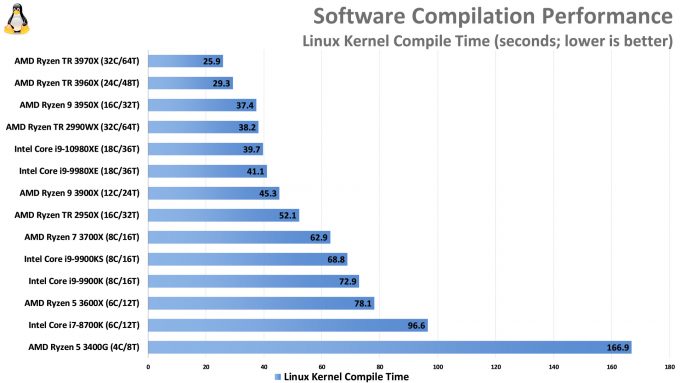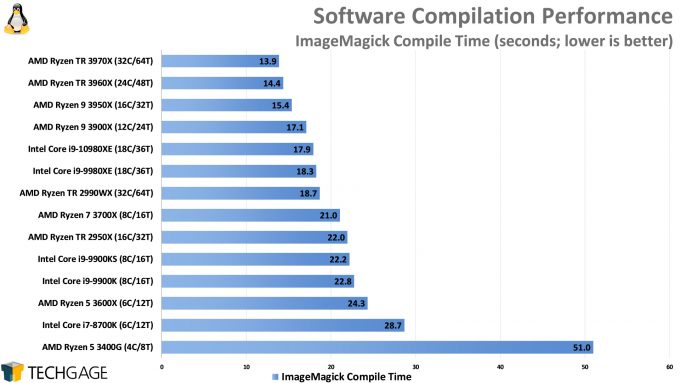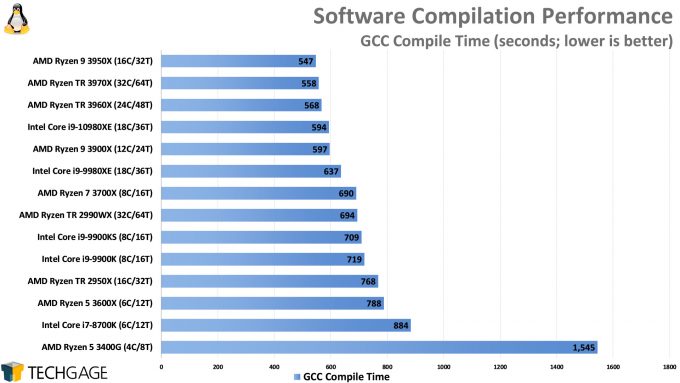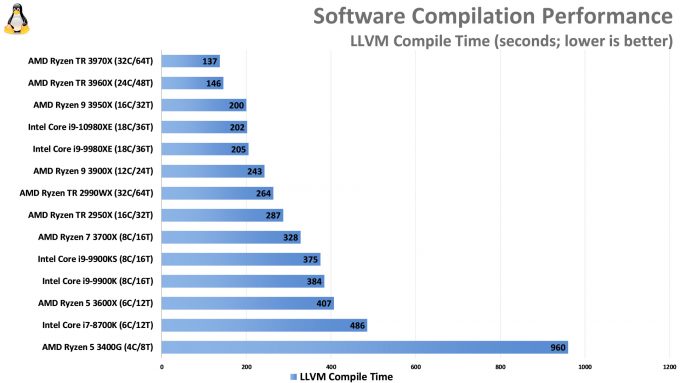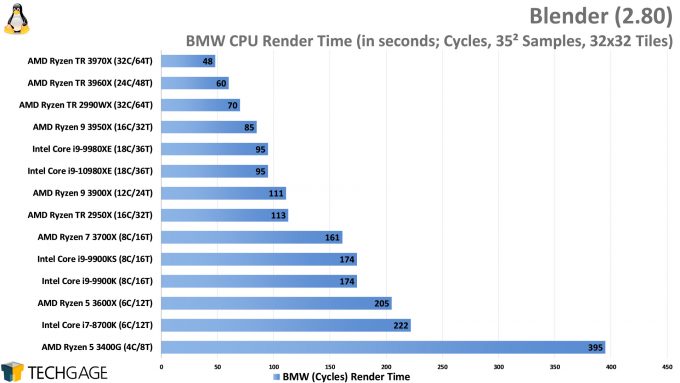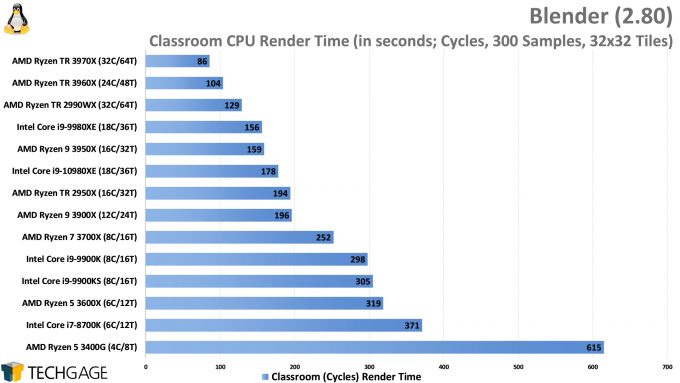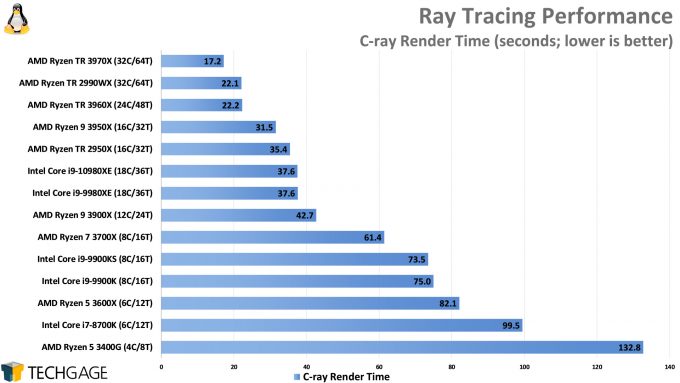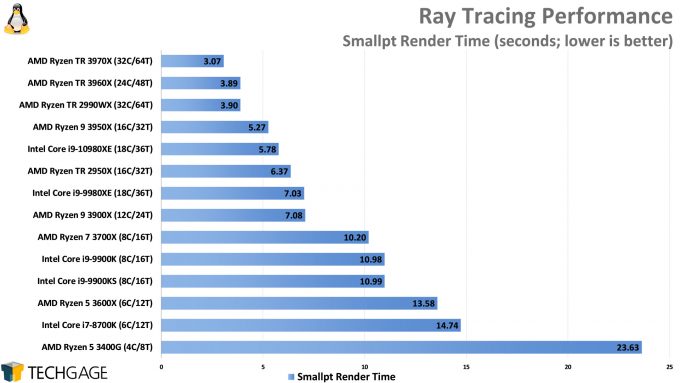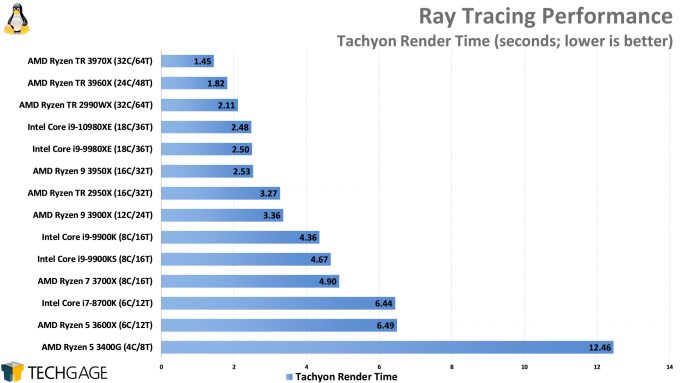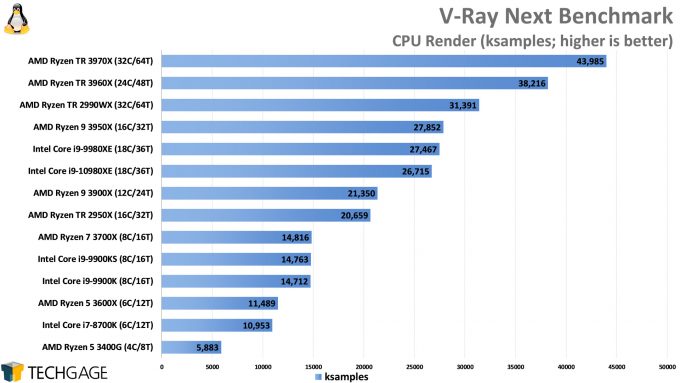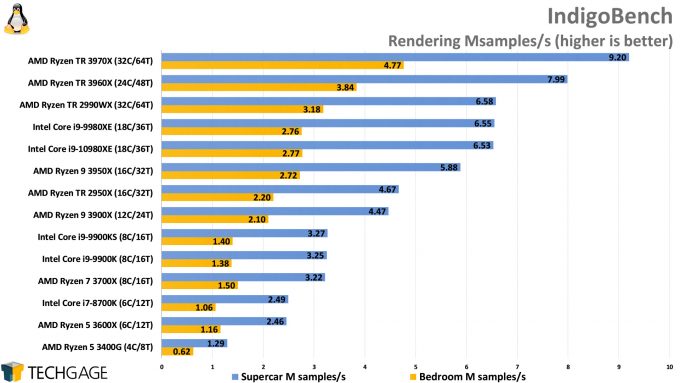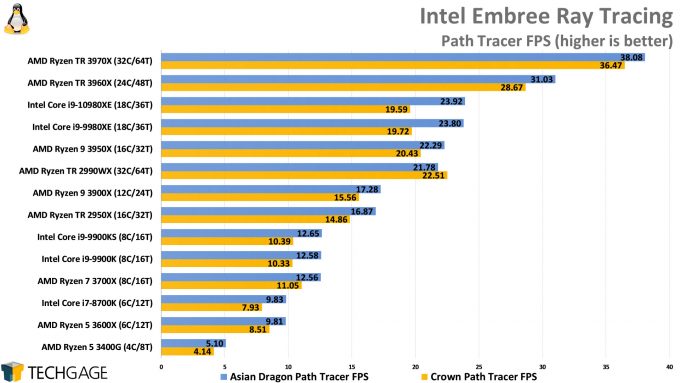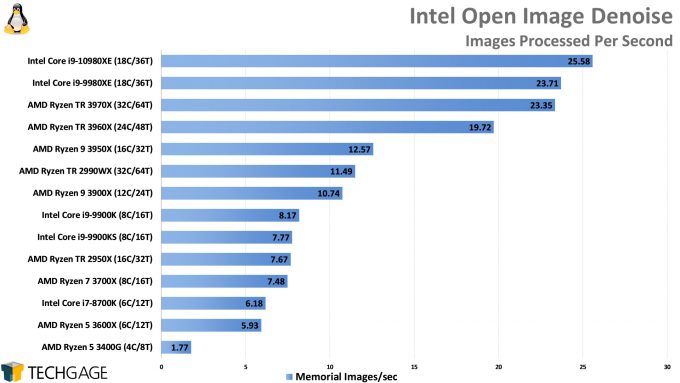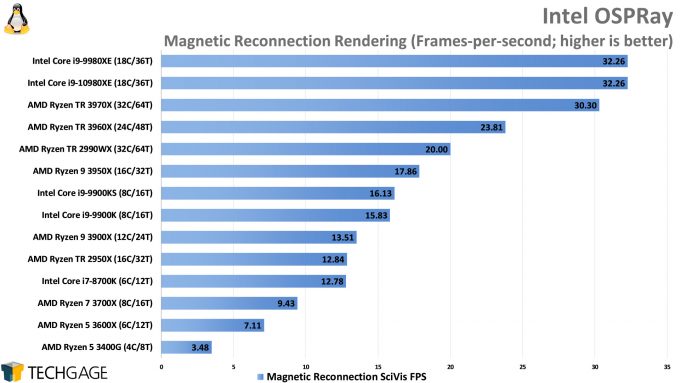- Qualcomm Launches Snapdragon 4 Gen 2 Mobile Platform
- AMD Launches Ryzen PRO 7000 Series Mobile & Desktop Platform
- Intel Launches Sleek Single-Slot Arc Pro A60 Workstation Graphics Card
- NVIDIA Announces Latest Ada Lovelace Additions: GeForce RTX 4060 Ti & RTX 4060
- Maxon Redshift With AMD Radeon GPU Rendering Support Now Available
AMD Ryzen Threadripper 3960X, 3970X & Intel Core i9-10980XE Linux Performance
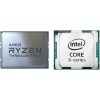
The day many have been waiting for has arrived: AMD and Intel have officially launched their respective next-gen enthusiast processors. In this article, we’re going to follow-up on our 3950X Linux article from last week to introduce both Intel’s Core i9-10980XE and AMD’s Ryzen Threadripper 3960X and 3970X into the test results.
Page 1 – Introduction; Compiling & Rendering Performance
As we did with the launch of AMD’s Ryzen 9 3950X, we’re going to kick off our performance coverage of the company’s newest Threadripper chips, along with Intel’s just-released Core i9-10980XE, under Linux.
We’re going to be following-up on this article with a full Windows-focused view of AMD’s new Threadrippers soon (we already tackled the 10980XE), but since our Linux testing can complete much faster, we’ve gone this route to get performance up in time for embargo.
On the Intel side, getting the i9-10980XE to work with Linux wasn’t even a concern, because the platform itself has remained unchanged. In fact, we’ve been using the same Intel X299 motherboard since the original Core X-series launch (7000-series). This platform is well taken care of support-wise, but the new TRX40 platform from AMD might throw a wrench into that whole process of “booting”.
You might recall that at the Zen 2 launch, Linux was simply unbootable until some fixes were released. This was due to an issue that impacted some Windows software, as well, but acted as a true roadblock for many Linux users, since it was the systemd manager that had to be patched. Today, the situation on Zen 2 is a lot better, but Threadripper has introduced a brand-new caveat.
To get Linux to boot on third-gen Threadripper right now, a boot flag of mce=off (machine check error) needs to be added. The fix for this was provided to me by Michael from Phoronix, who went through the painstaking effort of figuring out what the temporary fix even was. AMD itself doesn’t seem to know of Linux issues when the CPUs are handed out, because reviewers are left to find unavoidable roadblocks on their own.
We haven’t talked to AMD about this issue yet, but as with the Zen 2 launch, we’d expect the company to help fixes get to market sooner than later. We miss the days of simply building a new PC and booting up, but it’s hard to fault AMD too much with the limited number of engineers it has – something that has got to improve with the ongoing success of its Zen products.
Aside from all of that, the topic of conversation for Intel here is the new i9-10980XE, to see how it compares not just against its competition, but also its predecessor, 9980XE. On the AMD side, the Zen 2-based 3960X and 3970X Threadrippers have the potential to be absolute beasts. The Zen 2 architecture itself has proven to be a genuinely impressive jump over the original, and it’s hard to believe that Zen 3 is apparently already on track, and is expected to bring even more notable gains.
Here are both AMD’s and Intel’s lineups for those who want to see where these new chips are placed:
| AMD’s Ryzen & Ryzen Threadripper Lineup | ||||||
| Cores | Clock (Turbo) | L2+L3 | Memory | TDP | Price | |
| Threadripper WX-series | ||||||
| 3970X | 32 (64T) | 3.7 GHz (4.5) | 144MB | Quad | 280W | $1999 |
| 3960X | 24 (48T) | 3.8 GHz (4.5) | 140MB | Quad | 280W | $1399 |
| 2990WX | 32 (64T) | 3.0 GHz (4.2) | 16+64MB | Quad | 250W | $1799 |
| 2970WX | 24 (48T) | 3.0 GHz (4.2) | 12+64MB | Quad | 250W | $1299 |
| Threadripper X-series | ||||||
| 2950X | 16 (32T) | 3.5 GHz (4.4) | 8+32MB | Quad | 180W | $899 |
| 2920X | 12 (24T) | 3.5 GHz (4.3) | 6+32MB | Quad | 180W | $649 |
| Ryzen 9 | ||||||
| R9 3950X | 16 (32T) | 3.5 GHz (4.7) | 72MB | Dual | 105W | $749 |
| R9 3900X | 12 (24T) | 3.8 GHz (4.6) | 70MB | Dual | 105W | $499 |
| Ryzen 7 | ||||||
| R7 3800X | 8 (16T) | 3.9 GHz (4.5) | 36MB | Dual | 95W | $399 |
| R7 3700X | 8 (16T) | 3.6 GHz (4.4) | 36MB | Dual | 65W | $329 |
| Ryzen 5 | ||||||
| R5 3600X | 6 (12T) | 3.8 GHz (4.4) | 35MB | Dual | 95W | $249 |
| R5 3600 | 6 (12T) | 3.6 GHz (4.2) | 35MB | Dual | 65W | $199 |
| Ryzen w/ Radeon Vega Graphics | ||||||
| R5 3400G | 4 (8T) | 3.7 GHz (4.2) | 0.5+4MB | Dual | 65W | $149 |
| R3 3200G | 4 (4T) | 3.6 GHz (4.0) | 0.5+4MB | Dual | 65W | $99 |
| Intel Processor Lineup | |||||||
| Cores | Clock (Turbo 3.0) | L3 | Memory | IGP | TDP | Price | |
| Core X-Series | |||||||
| i9-10980XE | 18 (36T) | 3.0 GHz (4.8) | 24.75MB | Quad | No | 165W | $979 |
| i9-10940X | 14 (28T) | 3.3 GHz (4.8) | 19.25MB | Quad | No | 165W | $784 |
| i9-10920X | 12 (24T) | 3.5 GHz (4.8) | 19.25MB | Quad | No | 165W | $689 |
| i9-10900X | 10 (20T) | 3.7 GHz (4.7) | 19.25MB | Quad | No | 165W | $590 |
| i9-9980XE | 18 (36T) | 3.1 GHz (4.5) | 24.75MB | Quad | No | 165W | $1,979 |
| i9-9960X | 16 (32T) | 3.5 GHz (4.5) | 22MB | Quad | No | 165W | $1,684 |
| i9-9940X | 14 (28T) | 3.8 GHz (4.5) | 19.25MB | Quad | No | 165W | $1,387 |
| i9-9920X | 12 (24T) | 3.4 GHz (4.5) | 19.25MB | Quad | No | 165W | $1,189 |
| i9-9900X | 10 (20T) | 3.5 GHz (4.5) | 19.25MB | Quad | No | 165W | $989 |
| i9-9820X | 10 (20T) | 3.8 GHz (4.5) | 16.5MB | Quad | No | 165W | $898 |
| i9-9800X | 8 (16T) | 3.8 GHz (4.5) | 16.5MB | Quad | No | 165W | $589 |
| Core Series | |||||||
| i9-9900KS | 8 (16T) | 4.0 GHz (5.0) | 16MB | Dual | Yes | 127W | $513 |
| i9-9900K | 8 (16T) | 3.6 GHz (5.0) | 16MB | Dual | Yes | 95W | $480 |
| i9-9900 | 8 (16T) | 3.1 GHz (5.0) | 16MB | Dual | Yes | 65W | $439 |
| i7-9700K | 8 (8T) | 3.6 GHz (4.9) | 12MB | Dual | Yes | 95W | $374 |
| i7-9700 | 8 (8T) | 3.0 GHz (4.7) | 12MB | Dual | Yes | 65W | $323 |
| i5-9600K | 6 (6T) | 3.7 GHz (4.6) | 9MB | Dual | Yes | 65W | $262 |
| i5-9600 | 6 (6T) | 3.1 GHz (4.6) | 9MB | Dual | Yes | 65W | $213 |
| i5-9500 | 6 (6T) | 3.0 GHz (4.4) | 9MB | Dual | Yes | 65W | $192 |
| i5-9400 | 6 (6T) | 2.9 GHz (4.1) | 9MB | Dual | Yes | 65W | $182 |
| i3-9350K | 4 (4T) | 4.0 GHz (4.6) | 8MB | Dual | Yes | 91W | $173 |
| i3-9320 | 4 (4T) | 3.7 GHz (4.4) | 8MB | Dual | Yes | 62W | $154 |
| i3-9300 | 4 (4T) | 3.7 GHz (4.3) | 8MB | Dual | Yes | 62W | $143 |
| i3-9100 | 4 (4T) | 3.6 GHz (4.2) | 6MB | Dual | Yes | 65W | $122 |
There is not much else that can be said here; the only thing left lingering is the actual performance results. As of the time of this article’s publishing, we’re foregoing our usual commentary on each set of results due to time, although they may be slipped in later. We’re trying to get more performance content done ahead of travel this weekend; this really has proven to be an incredible month for launches and benchmarking.
Performance Testing CPUs Under Linux
| Techgage Workstation Test System(s) | |
| Processors | AMD Ryzen Threadripper 3970X (32C/64T; 3.7GHz) AMD Ryzen Threadripper 3960X (24C/48T; 3.8GHz) AMD Ryzen Threadripper 2990WX (32C/64T; 3.0 GHz) AMD Ryzen Threadripper 2950X (16C/32T; 3.5 GHz) AMD Ryzen 9 3950X (12C/24T; 3.8GHz) AMD Ryzen 9 3900X (12C/24T; 3.8GHz) AMD Ryzen 7 3700X (8C/16C; 3.6GHz) AMD Ryzen 5 3600X (6C/12C; 3.8 GHz) AMD Ryzen 5 3400G (4C/8T; 3.7 GHz) Intel Core i9-10980XE (18C/36T; 3.0GHz) Intel Core i9-9980XE (18C/36T; 3.0GHz) Intel Core i9-9900KS (8C/16T; 4.0 GHz) Intel Core i9-9900K (8C/16T; 3.6 GHz) Intel Core i9-8700K (8C/16T; 3.7 GHz) |
| Motherboards | AMD X399 (TR3gen): ASUS ROG Zenith II Extreme AMD X399 (TR2gen): MSI MEG CREATION AMD X570: Aorus X570 MASTER AMD B450: Aorus B450 Pro WiFi Intel Z390: ASUS ROG STRIX Z390-E GAMING Intel X299: ASUS ROG STRIX X299-E GAMING |
| Cooling | AMD X399 (TR3gen): NZXT Kraken X62 AMD X399 (TR2gen): Enermax LIQTECH TR4 240mm AMD X570: Corsair Hydro H115i PRO RGB AMD B450: AMD Wraith Spire Intel Z390: Corsair Hydro H100i V2 Intel X299: NZXT Kraken X62 |
| Chassis | AMD X399: Cooler Master MasterCase H500P Mesh AMD X570: Fractal Design Define C AMD B450: Enermax Equilence Intel Z390: NZXT S340 Elite Intel X299: Corsair Carbide 600C |
| Graphics | NVIDIA TITAN RTX |
| Memory | G.SKILL Flare X (F4-3200C14-8GFX) 4x8GB; DDR4-3200 14-14-14 |
| Et cetera | Ubuntu 19.10 (5.3.0-23 kernel) |
Our Linux configuration is simple overall. We’re using the latest version of Ubuntu (19.10) for our testing here, updated as much as possible. It includes the 5.3 kernel and GCC 9.2.1. A lot of our tests are run with the help of Phoronix Test Suite, with tests locked to a specific version to generate reliable data. We don’t do any real OS configuration outside of disabling sleep, and enforcing the performance power profile.
As for platform configurations, all of them have been tested with the same 32GB kit of DDR4-3200 memory, and outside of enabling the memory spec, the motherboard UEFIs are left stock. An exception to that rule is with ASUS motherboards on Intel platforms. On those, Multi-Core Enhancement is disabled to prevent a vendor-specific automatic overclock. MCE is not the same as regular Intel Turbo, and it needs to be off for true apples-to-apples results. The tested AMD boards do not have the same vendor-specific automatic overclocking feature.
Beyond all of that, all of the platforms have been updated to their latest UEFI, which for AMD means the latest AGESA release is reflected. No special patches are installed for the sake of security mitigation; we simply take the updates that Ubuntu provides us by default.
Compiling Performance
Rendering Performance
Support our efforts! With ad revenue at an all-time low for written websites, we're relying more than ever on reader support to help us continue putting so much effort into this type of content. You can support us by becoming a Patron, or by using our Amazon shopping affiliate links listed through our articles. Thanks for your support!




